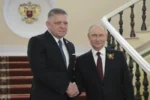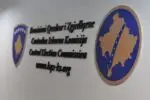In a recent report on Kosovo’s security, the European Parliament has sounded the alarm over the intensifying disinformation campaigns orchestrated by Russia and China, warning that these efforts aim to destabilize the Western Balkans and hinder the region’s path toward European Union integration.
The rapporteur for Kosovo, Member of the European Parliament Riho Terras, emphasized the seriousness of the threat in a public statement on the X platform:
“In my report on Kosovo, I pay particular attention to security. Disinformation from Russia and China is aimed at destabilizing the region and obstructing the Western Balkans’ path to the EU. The European Parliament urges Kosovo to respond more strongly to these external threats.”
The European People’s Party (EPP) echoed this concern, urging Kosovo to adopt decisive countermeasures against foreign disinformation, which frequently spreads through media outlets and social networks. These campaigns aim to sow division, erode public trust, and weaken democratic institutions in the region.
The European Parliament’s report also draws attention to the discrepancies in the EU’s approach toward Kosovo and Serbia in the enlargement process. While Kosovo received praise for its incremental progress and was encouraged to continue dialogue with Serbia, the tone toward Serbia was markedly more critical.
The rapporteur for Serbia, Tonino Picula, delivered a scathing assessment of the Serbian government’s handling of recent domestic unrest and foreign policy, particularly President Aleksandar Vučić’s visit to Moscow.
In response, Vučić claimed, “If the EU wants to punish me, it should punish me and not the whole country.” However, experts argue this stance is politically untenable. Dragoslav Raseta from the New Third Way organization noted that the EP report uses the strongest language yet regarding Serbia’s democratic backsliding and recommends reevaluating EU financial support if Serbia continues policies contrary to European values.
“Vučić’s rhetoric reflects autocratic tendencies. His visit to Moscow was designed to mobilize the nationalist, pro-Russian electorate — at the cost of Serbia’s European trajectory,” Raseta stated.
In contrast, the Kosovo section of the report highlights steady progress, urging the continuation of the EU-facilitated dialogue between Kosovo and Serbia, and the full implementation of signed agreements.
Still, not everyone agrees with the European Parliament’s conclusions. Milija Biševac, head of the Serbian People’s Movement, criticized the Kosovo report, claiming it does not accurately reflect realities on the ground. He pointed to the lack of genuine representation of Serbs in Kosovo’s institutions as a persistent and damaging issue.
“It is deeply regrettable that Serbs, who could play a constructive role in Kosovo’s policymaking, remain marginalized,” Biševac concluded.







